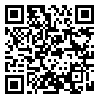Volume 6, Issue 4 (December 2024)
IEEPJ 2024, 6(4): 267-284 |
Back to browse issues page
Download citation:
BibTeX | RIS | EndNote | Medlars | ProCite | Reference Manager | RefWorks
Send citation to:



BibTeX | RIS | EndNote | Medlars | ProCite | Reference Manager | RefWorks
Send citation to:
Molaie S, Kouroshnia M, Mehryar A, Zarnaghash M. (2024). Evaluation of Psychometric Indices of the Revised Family Communication Pattern Instrument among Students of Shiraz and Kerman Universities. IEEPJ. 6(4), 267-284. doi:10.22034/6.4.267
URL: http://ieepj.hormozgan.ac.ir/article-1-537-en.html
URL: http://ieepj.hormozgan.ac.ir/article-1-537-en.html
1- Department of Educational Psychology, Marvdasht Branch, Islamic Azad University , Marvdasht, Iran
2- Department of Psychology, Marvdasht Branch, Islamic Azad University , Marvdasht, Iran ,maryam_kouroshnia@miau.ac.ir
3- Department of Psychology, Marvdasht Branch, Islamic Azad University , Marvdasht, Iran
4- Department of Psychology, Marvdasht Branch, Islamic Azad University , Marvdasht, Iran
2- Department of Psychology, Marvdasht Branch, Islamic Azad University , Marvdasht, Iran ,
3- Department of Psychology, Marvdasht Branch, Islamic Azad University , Marvdasht, Iran
4- Department of Psychology, Marvdasht Branch, Islamic Azad University , Marvdasht, Iran
Abstract: (1586 Views)
Objective: The aim of the current study was to examine the validity and reliability metrics of the Revised Family Communication Patterns (RFCP) Instrument among the student populations of Kerman and Shiraz universities in 2022.
Methods: A total of 388 students (comprising 167 males and 221 females) were selected utilizing a multi-stage cluster random sampling technique. The instruments employed in this research included the Revised Family Communication Patterns (RFCP) Instrument developed by Ritchie and Fitzpatrick, along with the Psychological Resilience Scale formulated by Freiburg et al. The validity of the questionnaire was assessed through an analysis of its construct validity via confirmatory factor analysis, as well as through the determination of criterion validity in conjunction with the Psychological Resilience Scale.
Results: Following the execution of confirmatory factor analysis, the factorial configuration of the questionnaire was validated across two dimensions: conversation orientation and conformity orientation. The analysis of criterion validity revealed that conversation orientation exhibits a positive correlation with psychological resilience, whereas conformity orientation demonstrates a negative correlation with psychological resilience. To evaluate the reliability of the questionnaire, both Cronbach's alpha and the halving method were employed, the outcomes of which supported the reliability of this instrument for the student demographic.
Conclusions: Overall, the findings of this study indicated that the Revised Family Communication Patterns Instrument is appropriate for assessing this variable and its respective components among students.
Methods: A total of 388 students (comprising 167 males and 221 females) were selected utilizing a multi-stage cluster random sampling technique. The instruments employed in this research included the Revised Family Communication Patterns (RFCP) Instrument developed by Ritchie and Fitzpatrick, along with the Psychological Resilience Scale formulated by Freiburg et al. The validity of the questionnaire was assessed through an analysis of its construct validity via confirmatory factor analysis, as well as through the determination of criterion validity in conjunction with the Psychological Resilience Scale.
Results: Following the execution of confirmatory factor analysis, the factorial configuration of the questionnaire was validated across two dimensions: conversation orientation and conformity orientation. The analysis of criterion validity revealed that conversation orientation exhibits a positive correlation with psychological resilience, whereas conformity orientation demonstrates a negative correlation with psychological resilience. To evaluate the reliability of the questionnaire, both Cronbach's alpha and the halving method were employed, the outcomes of which supported the reliability of this instrument for the student demographic.
Conclusions: Overall, the findings of this study indicated that the Revised Family Communication Patterns Instrument is appropriate for assessing this variable and its respective components among students.
Keywords: Revised family communication patterns instrument, Conversation orientation, Conformity orientation, Validity, Reliability
Type of Study: Original |
Subject:
Educational Psychology
Received: 2022/04/20 | Accepted: 2022/06/29 | Published: 2024/12/1
Received: 2022/04/20 | Accepted: 2022/06/29 | Published: 2024/12/1
Send email to the article author
| Rights and permissions | |
 |
This work is licensed under a Creative Commons Attribution-NonCommercial 4.0 International License. |







